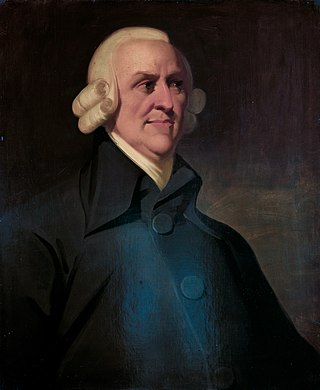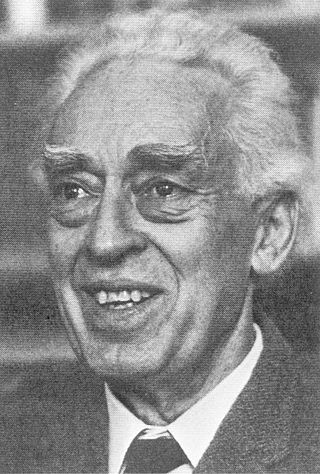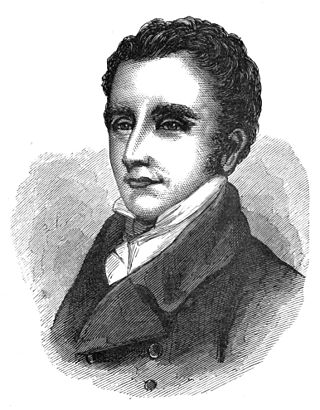Related Research Articles

Adam Smith was a Scottish economist and philosopher who was a pioneer in the thinking of political economy and key figure during the Scottish Enlightenment. Seen by some as "The Father of Economics" or "The Father of Capitalism", he wrote two classic works, The Theory of Moral Sentiments (1759) and An Inquiry into the Nature and Causes of the Wealth of Nations (1776). The latter, often abbreviated as The Wealth of Nations, is considered his magnum opus and the first modern work that treats economics as a comprehensive system and as an academic discipline. Smith refuses to explain the distribution of wealth and power in terms of God's will and instead appeals to natural, political, social, economic and technological factors and the interactions between them. Among other economic theories, the work introduced Smith's idea of absolute advantage.

David Hume was a Scottish Enlightenment philosopher, historian, economist, librarian, and essayist, who is best known today for his highly influential system of philosophical empiricism, skepticism, and naturalism. Beginning with A Treatise of Human Nature (1739–40), Hume strove to create a naturalistic science of man that examined the psychological basis of human nature. Hume followed John Locke in rejecting the existence of innate ideas, concluding that all human knowledge derives solely from experience. This places him with Francis Bacon, Thomas Hobbes, John Locke, and George Berkeley as an empiricist.
Natural theology, once also termed physico-theology, is a type of theology that seeks to provide arguments for theological topics based on reason and the discoveries of science, the project of arguing for the existence of God on the basis of observed so-called natural facts, and through natural phenomena viewed as divine, or complexities of nature seen as evidence of a divine plan or Will of God, which includes nature itself.

Piero Sraffa, FBA was an influential Italian economist who served as lecturer of economics at the University of Cambridge. His book Production of Commodities by Means of Commodities is taken as founding the neo-Ricardian school of economics.

Francis Hutcheson LLD was an Irish philosopher born in Ulster to a family of Scottish Presbyterians who became known as one of the founding fathers of the Scottish Enlightenment. He was Professor of Moral Philosophy at Glasgow University and is remembered as author of A System of Moral Philosophy.
Hume's principle or HP says that the number of Fs is equal to the number of Gs if and only if there is a one-to-one correspondence between the Fs and the Gs. HP can be stated formally in systems of second-order logic. Hume's principle is named for the Scottish philosopher David Hume and was coined by George Boolos.
Associationism is the idea that mental processes operate by the association of one mental state with its successor states. It holds that all mental processes are made up of discrete psychological elements and their combinations, which are believed to be made up of sensations or simple feelings. In philosophy, this idea is viewed as the outcome of empiricism and sensationism. The concept encompasses a psychological theory as well as comprehensive philosophical foundation and scientific methodology.

Pity is a sympathetic sorrow evoked by the suffering of others. The word is comparable to compassion, condolence, or empathy. It derives from the Latin pietas. Self-pity is pity directed towards oneself.
The watchmaker analogy or watchmaker argument is a teleological argument used to argue for the pseudoscientific concept of intelligent design. The analogy states that a design implies a designer, by an intelligent designer, i.e. a creator deity. The watchmaker analogy was given by William Paley in his 1802 book Natural Theology or Evidences of the Existence and Attributes of the Deity. The original analogy played a prominent role in natural theology and the "argument from design," where it was used to support arguments for the existence of God of the universe, in both Christianity and Deism. Prior to Paley, however, Sir Isaac Newton, René Descartes, and others from the time of the scientific revolution had each believed "that the physical laws he [each] had uncovered revealed the mechanical perfection of the workings of the universe to be akin to a watch, wherein the watchmaker is God."

The Fable of The Bees: or, Private Vices, Publick Benefits (1714) is a book by the Anglo-Dutch social philosopher Bernard Mandeville. It consists of the satirical poem The Grumbling Hive: or, Knaves turn'd Honest, which was first published anonymously in 1705; a prose discussion of the poem, called "Remarks"; and an essay, An Enquiry into the Origin of Moral Virtue. In 1723, a second edition was published with two new essays.
The history of economic thought is the study of the philosophies of the different thinkers and theories in the subjects that later became political economy and economics, from the ancient world to the present day in the 21st century. This field encompasses many disparate schools of economic thought. Ancient Greek writers such as the philosopher Aristotle examined ideas about the art of wealth acquisition, and questioned whether property is best left in private or public hands. In the Middle Ages, Thomas Aquinas argued that it was a moral obligation of businesses to sell goods at a just price.
"Of Miracles" is the title of Section X of David Hume's An Enquiry Concerning Human Understanding (1748).
An Enquiry Concerning the Principles of Morals (EPM) is a book by Scottish enlightenment philosopher David Hume. In it, Hume argues that the foundations of morals lie with sentiment, not reason.
Moral sense theory is a theory in moral epistemology and meta-ethics concerning the discovery of moral truths. Moral sense theory typically holds that distinctions between morality and immorality are discovered by emotional responses to experience. Some take it to be primarily a view about the nature of moral facts or moral beliefs —this form of the view more often goes by the name "sentimentalism". Others take the view to be primarily about the nature of justifying moral beliefs —this form of the view more often goes by the name "moral sense theory". However, some theorists take the view to be one which claims that both moral facts and how one comes to be justified in believing them are necessarily bound up with human emotions.
Moral rationalism, also called ethical rationalism, is a view in meta-ethics according to which moral principles are knowable a priori, by reason alone. Some prominent figures in the history of philosophy who have defended moral rationalism are Plato and Immanuel Kant. Perhaps the most prominent figure in the history of philosophy who has rejected moral rationalism is David Hume. Recent philosophers who have defended moral rationalism include Richard Hare, Christine Korsgaard, Alan Gewirth, and Michael Smith.
"The Missing Shade of Blue" is an example introduced by the Scottish philosopher David Hume to show that it is at least conceivable that the mind can generate an idea without first being exposed to the relevant sensory experience. It is regarded as a problem by philosophers because it appears to stand in direct contradiction to what Hume had just written.

British philosophy refers to the philosophical tradition of the British people. "The native characteristics of British philosophy are these: common sense, dislike of complication, a strong preference for the concrete over the abstract and a certain awkward honesty of method in which an occasional pearl of poetry is embedded".
Watkins's Biographical Dictionary was originally published in 1800, with a second edition in 1825, as An Historical Account of the lives, characters and works of the most eminent persons in every age and nation, from the earliest times to the present. It was compiled by John Watkins, LL.D., and published by Longman, Rees, Orme, Brown and Green.

Thomas Longman was an English publisher who founded the publishing house of Longman.
The Sraffa–Hayek debate is debate between Piero Sraffa and Friedrich Hayek in the 1930s. In 1931, Hayek critiqued John Maynard Keynes's Treatise on Money (1930) in his "Reflections on the pure theory of Mr. J. M. Keynes" and published his lectures at the LSE in book form as Prices and Production. Keynes replied to Hayek.
References
- ↑ Hume, David (2007) [First published 1740]. Norton, David Fate; Norton, Mary J. (eds.). A Treatise of Human Nature. Vol. 1. Oxford: Clarendon. p. 403. ISBN 978-0-19-926383-7.
- R.W.Connon, M. Pollard, "On the authorship of Hume's Abstract", The Philosophical Quarterly 1977 .
- John O. Nelson, "The Authorship of the Abstract Revisited," Hume Studies 17, no. 1 (April 1991): 83-86.
- John O. Nelson, "Has the Authorship of An Abstract of a Treatise of Human Nature Really Been Decided?" The Philosophical Quarterly 26, no. 102 (January 1976): 91.
- "New Books", Norman Kemp Smith, Mind 1938 XLVII(188):522-524,
- An Abstract of a Book lately Published; Entitled, A Treatise of Human Nature, &c. Wherein the Chief Argument of that Book is farther Illustrated and Explained, (London, 1740).
- "The Authorship of the Abstract Revisited" David Raynor, Hume Studies, Volume XIX, Number 1 (April, 1993) 213-215 Archived 2011-07-26 at the Wayback Machine .